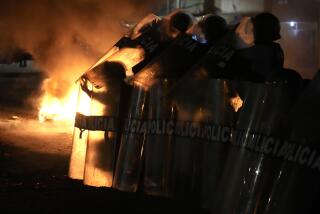PEACEKEEPING : A Red-Faced United Nations Keeps Lid on Somalia Report
- Share via
UNITED NATIONS — So sensitive did the United Nations deem the report on Somalia that the 15 ambassadors on the Security Council had to slip into a secretive room high in the Secretariat building a few weeks ago and read it on the spot.
That security has now been relaxed. Copies have been sent to ambassadors, and some have reproduced them for journalists.
But the United Nations has still not published the document--the official report of the commission of inquiry set up to investigate the debacle in Somalia last fall.
Yet the report--according to a copy now circulating among reporters--hides no bombshells and few surprises and, in general, reaches conclusions that many analysts already share about the operation in Somalia. Nevertheless, the report is embarrassing, dwelling on many foolish missteps, especially by Americans and Italians, in the failed hunt for warlord Mohammed Farah Aidid, and it is clearly the embarrassment that has made the United Nations hesitant about publication.
The commission--Chief Justice Matthew M.S.W. Ngulube of Zambia, the chairman, and Lt. Gen. Emmanuel A. Erskine of Ghana and Lt. Gen. Gustav Hagglund of Finland--concluded that Aidid’s faction orchestrated the attacks that killed 24 Pakistani peacekeepers last June. But the panel accused the United Nations of political errors that provoked these attacks and of inadequate preparation for the kind of war mounted afterward in the hunt for Aidid.
Moreover, the commission says that “the United Nations is helpless if confronted with the inhumane and unscrupulous means a reckless militia can resort to on home turf.”
As a result, the commission goes on, the mandate of the mission--to disarm the factions, by force if necessary--”was too pretentious in relation to the instruments and to the will to implement it.”
The U.N. operation was largely American-run. Retired Adm. Jonathan Howe was the secretary general’s special representative--the top U.N. official on the scene--while Lt. Gen. Cevik Bir of Turkey was handpicked by the U.S. government to serve as the military force commander. His deputy was Maj. Gen. Thomas Montgomery of the U.S. Army.
The commission describes this leadership and its aides as politically naive, largely ignorant of Somali culture and politics and inexperienced in peacekeeping operations. For the most part, the report does not identify those who may have led the mission astray with their decisions and advice, but it does single out U.S. diplomat April Glaspie in one example of an evident political miscalculation.
Glaspie, who served as a political adviser to Howe, was accused by critics of failing to stand up to Iraqi President Saddam Hussein when she was the last U.S. ambassador to Iraq. But in this case, the report makes clear, she stood up to Aidid.
While Glaspie was substituting for the absent deputy special representative, the commission says, the United Nations maneuvered to replace Aidid as chairman of a political conference in the central region of Somalia. This angered Aidid, scuttled the conference and led to virulent propaganda against the United Nations on his Radio Mogadishu.
On the military side, the commission underscores the problem caused by the refusal of Italian officers to follow Bir’s orders in the hunt for Aidid. Ordered to take a position by force, the Italians instead negotiated with Aidid’s militia to reach the position.
The commission also reports that the peacekeepers often marched unwarily into ferocious military traps because U.N. political advisers did not keep them informed about the political implications of what they were doing.
The commission also states that the United Nations’ problems were made more complex because the U.S. Rangers and the U.S. Quick Response Force were outside U.N. control yet had a decisive influence on the whole operation. When the deaths of 18 Americans in a raid Oct. 3 prompted President Clinton to announce a U.S. withdrawal by March 31, “the decision . . . left the United Nations with little choice but to change its policy and abandon the hunt for Aidid.”
More to Read
Sign up for Essential California
The most important California stories and recommendations in your inbox every morning.
You may occasionally receive promotional content from the Los Angeles Times.










